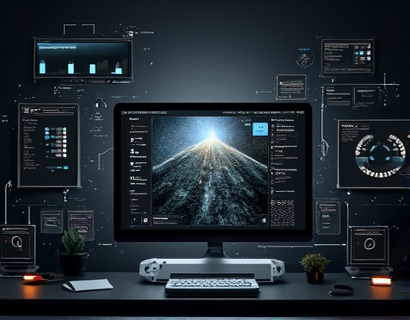AI Chat Interface: Transforming Competitive Gaming Community Engagement
The landscape of competitive gaming and esports is rapidly evolving, driven by technological advancements and the growing demand for immersive, interactive experiences. One of the most significant innovations in this space is the integration of AI-powered chat interfaces, designed to revolutionize how tournament enthusiasts, players, and fans engage with the gaming community. This article delves into the transformative impact of these AI chat interfaces, exploring how they enhance real-time updates, insights, and interactive discussions, ultimately enriching the overall community engagement and accessibility in competitive gaming.
Enhancing Real-Time Updates
One of the primary advantages of AI chat interfaces in competitive gaming is their ability to provide real-time updates. Traditional methods of sharing information, such as through static websites or scheduled social media posts, often fall short in delivering timely and relevant content. AI chat interfaces, however, can instantly push updates to users, ensuring they are always in the loop. Whether it's the latest tournament schedules, player standings, or breaking news, these platforms can disseminate information with unprecedented speed and accuracy.
For instance, during a live tournament, an AI chat interface can provide real-time scores, highlight key moments, and offer instant replays or analysis. This immediacy not only keeps the audience engaged but also enhances their understanding of the game, making the viewing experience more dynamic and interactive. For players and teams, real-time updates can include performance metrics, opponent analysis, and strategic advice, all of which can be crucial during critical moments of a match.
Providing In-Depth Insights
Beyond mere updates, AI chat interfaces can offer in-depth insights that enrich the gaming experience. By leveraging advanced data analytics and machine learning algorithms, these platforms can analyze vast amounts of data to provide meaningful insights. For example, AI can break down player performance, identify trends, and predict outcomes based on historical data. This level of analysis is invaluable for both casual fans and serious enthusiasts who seek a deeper understanding of the game.
For tournament organizers, AI insights can help in refining the event structure, optimizing match schedules, and enhancing the overall production value. For players, these insights can inform training regimens, strategic planning, and even mental preparation. Fans can benefit from detailed player profiles, team dynamics, and historical performance data, all presented in an easily digestible format.
Facilitating Interactive Discussions
Interactive discussions are a cornerstone of community engagement in competitive gaming. AI chat interfaces take this to a new level by fostering real-time, context-aware conversations. Users can engage in discussions about ongoing matches, share their thoughts, and participate in polls and Q&A sessions. The AI ensures that these discussions remain relevant and engaging by dynamically adjusting to the current context of the game.
For example, during a high-stakes match, users can ask for real-time analysis, request specific statistics, or even propose hypothetical scenarios. The AI can respond with tailored information, sparking further discussion and debate. This interactive element not only enhances user engagement but also creates a more inclusive and participatory community. Fans feel more connected to the game and to each other, fostering a stronger sense of belonging and loyalty.
Improving Accessibility
Accessibility is another critical area where AI chat interfaces make a significant impact. For individuals with disabilities or those in regions with limited internet access, traditional gaming platforms can be barriers. AI chat interfaces can bridge these gaps by providing text-based, voice-activated, and even sign language-supported interactions. This ensures that everyone, regardless of their physical or geographical constraints, can participate in the gaming community.
Moreover, AI can translate conversations in real-time, breaking down language barriers and making the community more global. This inclusivity not only broadens the audience but also enriches the diversity of perspectives and ideas within the community. For tournament organizers, this means a larger and more engaged audience, which can translate into increased viewership and participation.
Enhancing User Experience
The user experience is paramount in the success of any digital platform, and AI chat interfaces excel in this regard. By using natural language processing and machine learning, these platforms can understand and respond to user queries in a human-like manner. This level of sophistication makes interactions feel more natural and intuitive, reducing the learning curve and increasing user satisfaction.
Personalization is another key feature. AI can learn from user behavior and preferences, tailoring the content and interactions to each individual. For instance, a user who frequently follows a particular team might receive more updates and insights related to that team. This personalized approach not only keeps users engaged but also increases the likelihood of them returning to the platform.
Supporting Community Moderation
Maintaining a healthy and respectful community is essential for the long-term success of any gaming platform. AI chat interfaces can play a crucial role in community moderation by automatically detecting and filtering out inappropriate content, such as harassment or spam. This ensures that discussions remain focused and positive, fostering a welcoming environment for all users.
AI can also assist moderators by providing real-time alerts and insights into community dynamics. This allows human moderators to intervene more effectively when necessary, ensuring that the community guidelines are upheld. The combination of AI and human moderation creates a robust system that can adapt to various scenarios and maintain a high standard of community behavior.
Driving Engagement Through Gamification
Gamification is a powerful tool for driving user engagement, and AI chat interfaces can integrate this concept seamlessly. By incorporating game-like elements such as badges, leaderboards, and challenges, these platforms can motivate users to participate more actively. For example, users can earn badges for contributing valuable insights or for consistently engaging in discussions. Leaderboards can showcase the most active or knowledgeable users, fostering a sense of competition and achievement.
Challenges and mini-games can be integrated to keep users engaged during downtimes, such as between matches or during breaks. These interactive elements not only enhance the user experience but also increase the overall time spent on the platform. For tournament organizers, gamification can be used to encourage fan participation in pre-tournament activities, such as predicting match outcomes or voting on game-related decisions.
Facilitating Sponsorship and Monetization
For tournament organizers and content creators, AI chat interfaces can also streamline sponsorship and monetization efforts. By analyzing user data and engagement patterns, AI can help identify potential sponsors and tailor marketing offers that align with the audience's interests. This data-driven approach can lead to more effective partnerships and higher revenue for the platform.
Additionally, AI can manage and optimize in-platform advertisements, ensuring they are relevant and non-intrusive. This not only enhances the user experience but also increases the likelihood of ad clicks and conversions. For content creators, AI can provide insights into the most engaging content types and times, helping them maximize their monetization strategies through ads, subscriptions, or merchandise sales.
Conclusion
The integration of AI chat interfaces in competitive gaming and esports represents a significant leap forward in community engagement and accessibility. By providing real-time updates, in-depth insights, and interactive discussions, these platforms enhance the overall experience for enthusiasts, players, and fans. The improved accessibility and user experience, coupled with robust community moderation and gamification, create a more inclusive and dynamic community. As technology continues to evolve, the potential for AI to transform the gaming landscape is vast, promising a future where the boundaries between players, fans, and content creators are further blurred, leading to a more connected and vibrant gaming world.










































